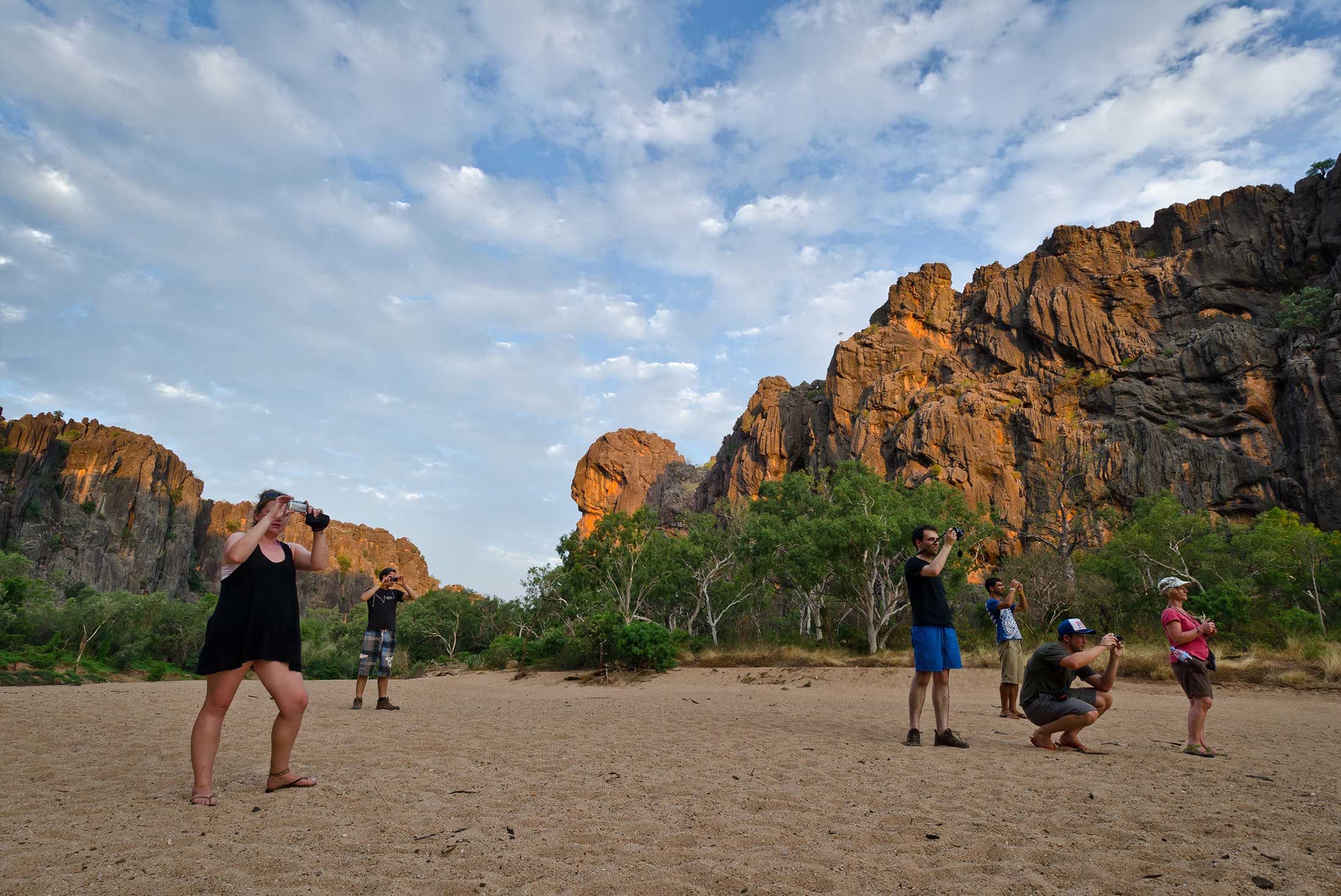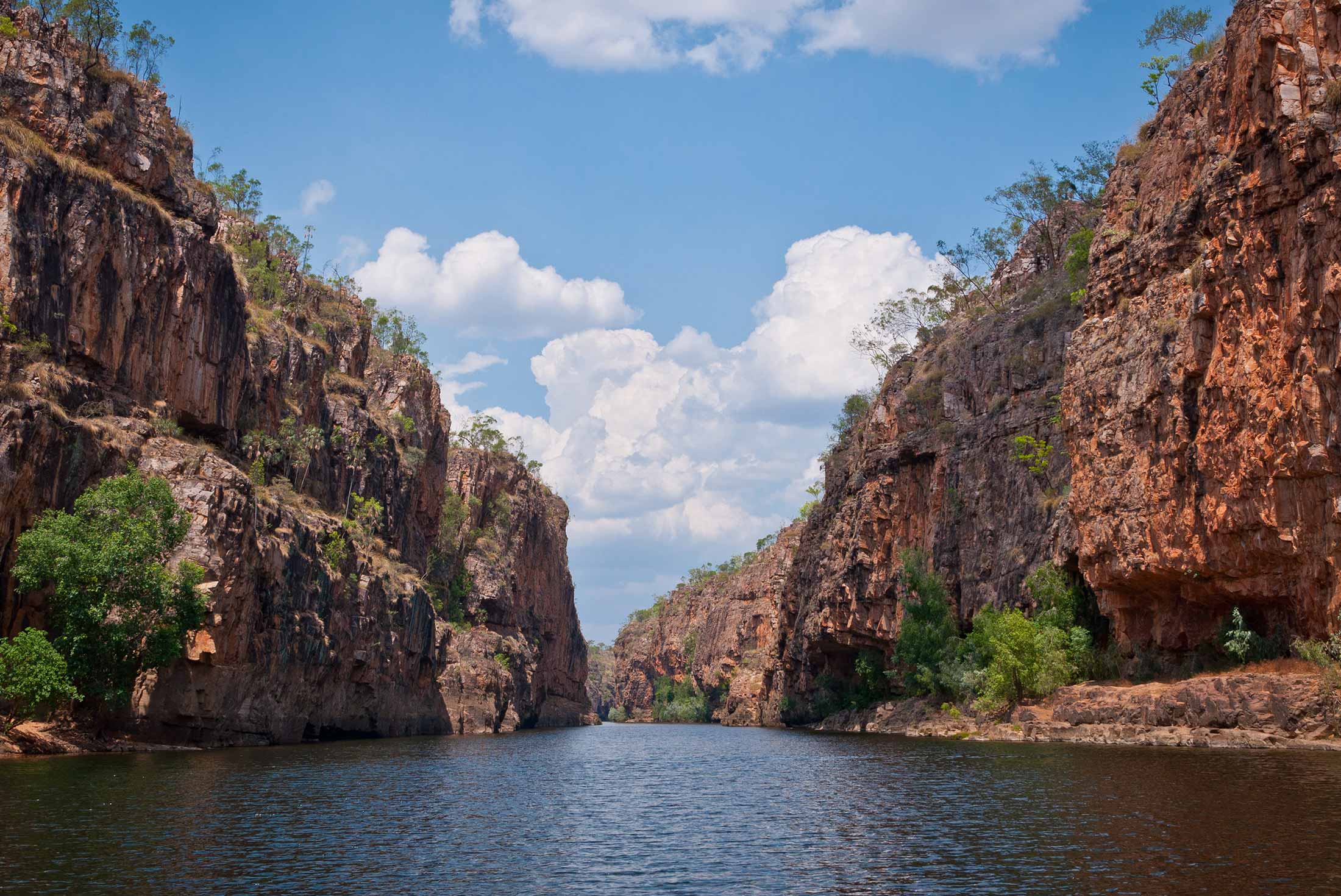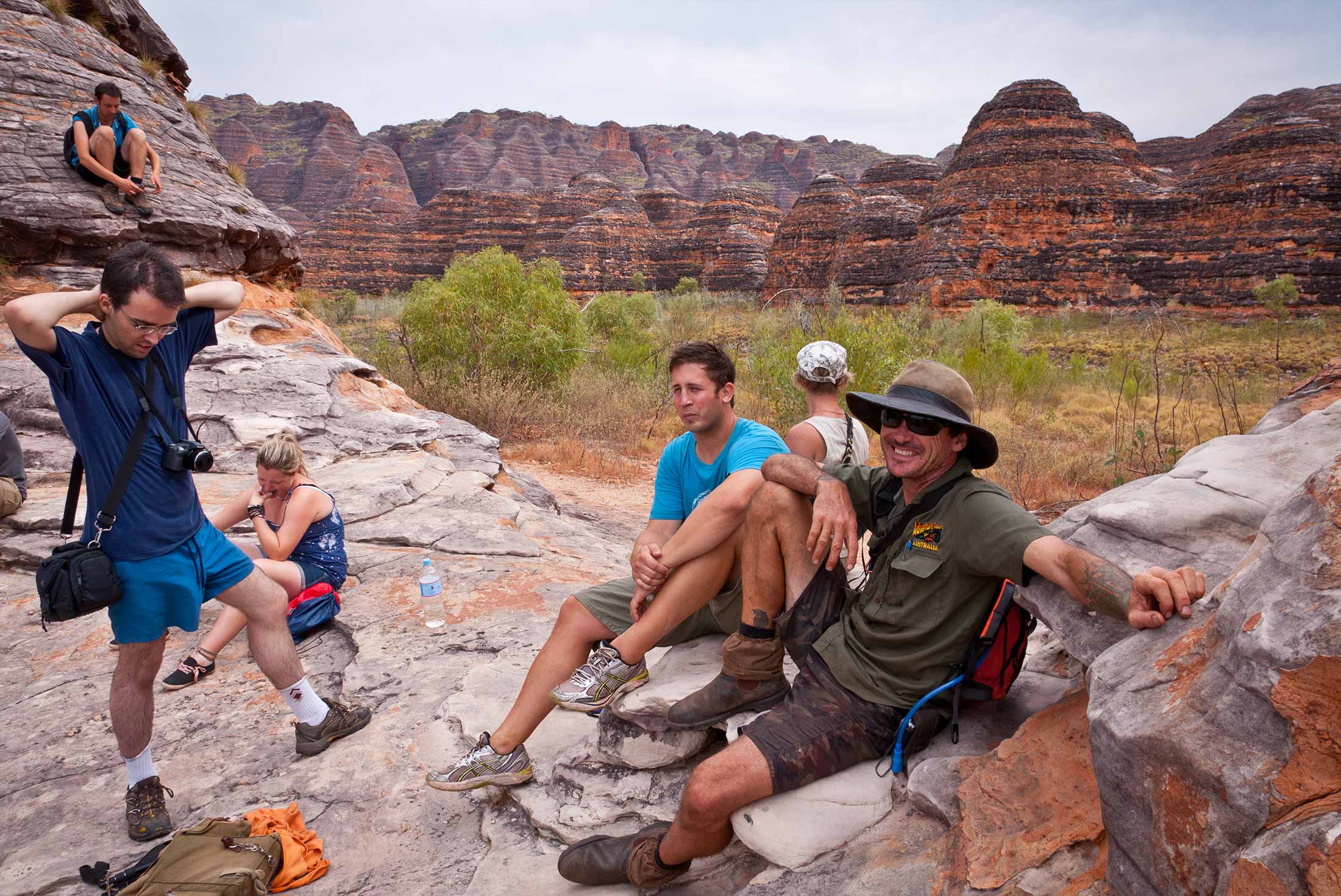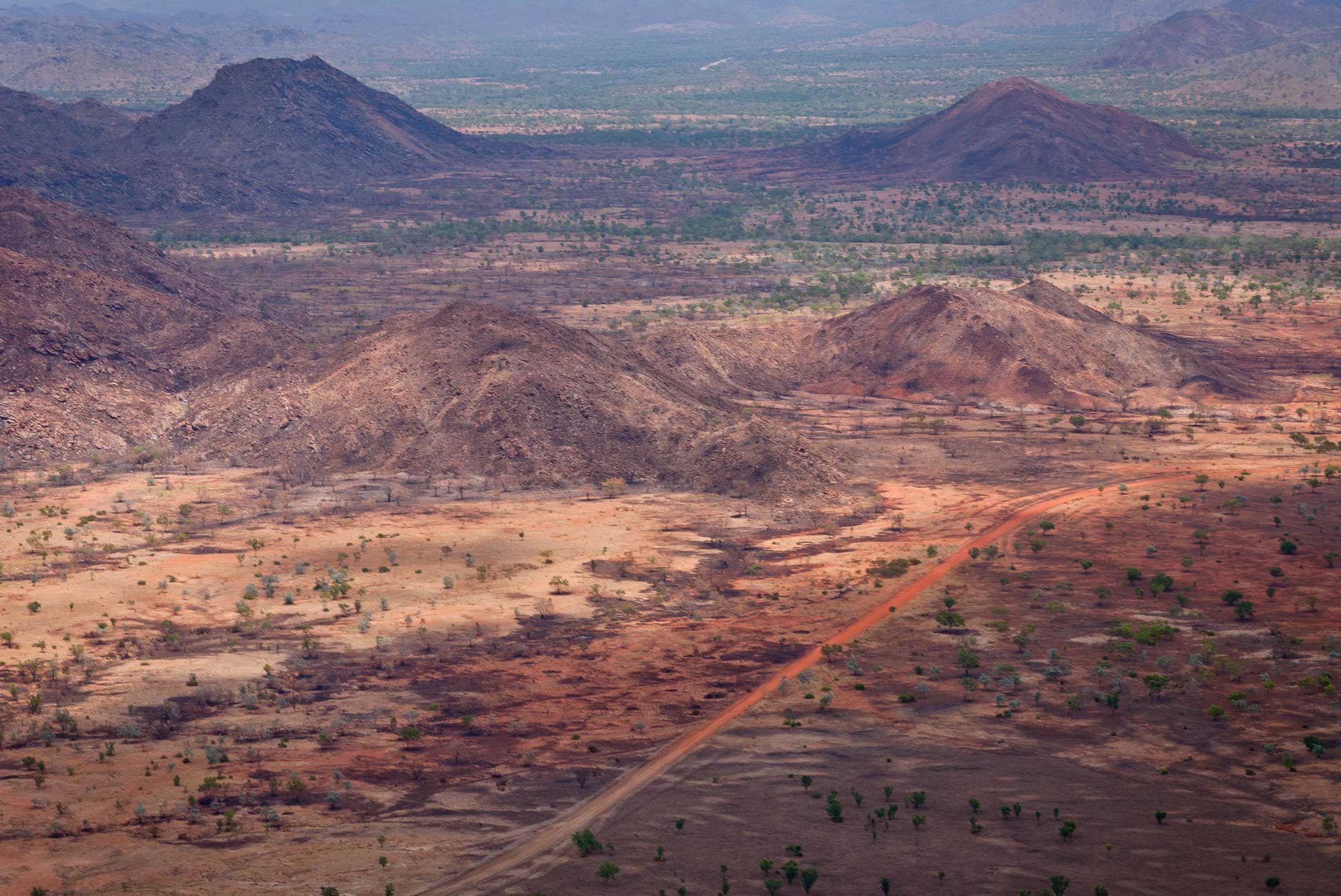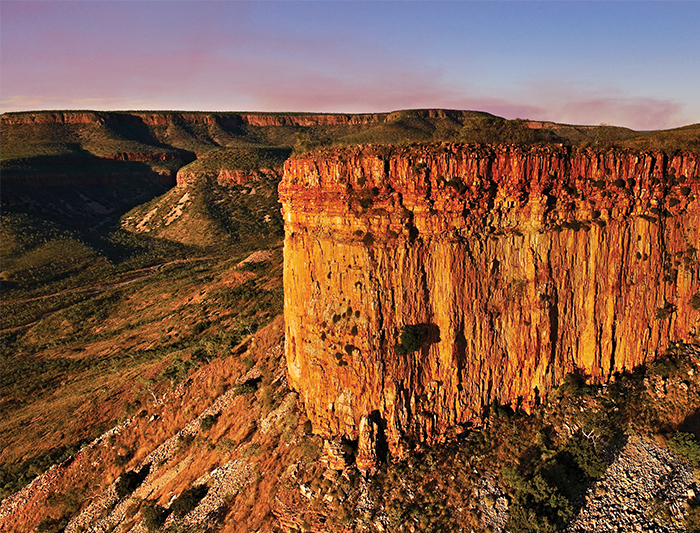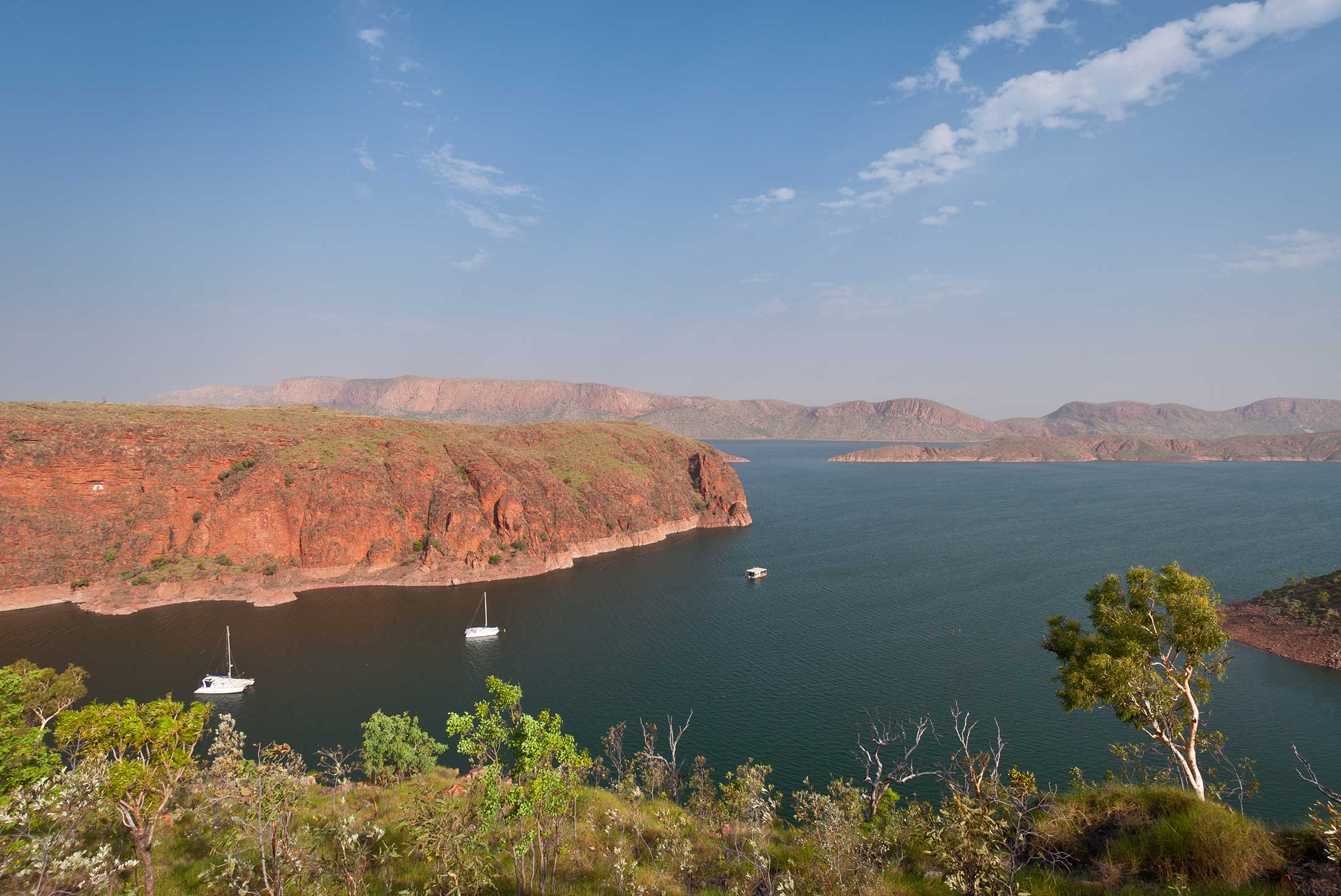- Tunnell Creek has a rich Aboriginal and bushranger history. Walk through the underground passage, learning about the culture and traditions of the first Australians
- Discover a hidden highlight of the West Kimberley with a stop in the idyllic retreat of Bell Gorge
- Test the 4WD as you take on the rugged terrain of the Mitchell Plateau. This extraordinary area is home to the huge, four-tiered Mitchell Falls – a stunning testament to the power and scale of nature
- Enjoy plenty of time to discover the untamed natural beauty of El Questro Station. Paddle around in waterfalls, hike through gorges and access remote parts of this huge park on adventurous 4WD expeditions
- The red domes of the Bungle Bungle Ranges in Purnululu National Park form one of the most iconic Australian landscapes in existence. You'll have two nights and w hole day to explore the gorges and valleys of the park, not to mention soak up a few fiery sunsets
- Climb aboard a Nitnit Dreaming Cultural Cruise through the inspiring natural wonder of the Nitmiluk Gorge – made up of 13 different chasms carved by the Katherine River – and acquire an understanding of Jawoyn customs
18 Jan 2021
Kimberley Trail Broome to Darwin
PKTBD-B
Validity: 01 Apr 2020 to 31 Dec 2021
Experience the beautiful rugged Kimberley on this true Australian adventure from Broome to Darwin. Uncover some of the country’s most incredible, untouched territory on an all-terrain journey down the Gibb River Road, taking in hidden caves and indigenous history at Tunnel Creek, the unbelievably picturesque oases of the Bell, Galvans, Adcock gorges, and the vast waterfalls of the Mitchell Plateau. Soak up the idyllic isolation of remote stations like El Questro and head out to discover secret palm-shaded waterholes. Squeeze through the narrow rock passages of the striped Bungle Bungles, sail across the vast waters of Lake Argyle, and learn the customs of the traditional land-owners while cruising through the gorges of Nitmiluk. Come face-to-face with vast horizons and immense wilderness with this unforgettable taste of Australia at its most untamed.
Basix
Explorer,Overland
4WD vehicle
3
This trip is recommended for fitter travellers. There are included hikes from 5 to 9kms a day over uneven terrain, often in high temperatures. Some hikes may require sections of walking/swimming through water. Temperatures can be extreme; very high during summer days and very cold during winter nights. Due to the remote nature of the Kimberley region we use bush camps with limited facilities on some nights. The operator reserves the right to assess the fitness capability of passengers prior to tour departure. Tour is not suitable for children. There is a STRICT LUGGAGE LIMIT of 15kgs per person, in a backpack or soft bag.
Kimberley Travellers Lodge
9a Bagot St
Broome
6725
AUSTRALIA
You are welcome to arrive in Broome at any time today and make your way to the Kimberley Travellers Lodge at 2 Bagot Street, Broome. The accommodation is a ten minute walk from the airport, or you can arrange a taxi or transfer mini bus upon arrival at the airport. There will be a notice at the accommodation reception about the welcome dinner in the evening.
Your Darwin Hotel
Multiple pick up points
Darwin
AUSTRALIA
This tour finishes on arrival in Darwin at around 6:30pm. Please take this into consideration when booking any flights out of Darwin. We recommend you book accommodation in advance to extend your stay here. Please contact our sales staff if you would like to arrange accommodation in Darwin after your tour.
1. This trip starts in Broome with an arrival day and finishes in Darwin after breakfast. Onward travel can be booked any time. 2. This trip requires a sleeping bag 3. This trip is available in Original, please see code PKTBD 4. Trip runs in reverse from Darwin to Broome. Please see code PKTDB-B 5. An upgrade to a room with ensuite bathroom in Broome is available upon request. Please speak to your booking agent if you are interested.
All group trips are accompanied by a group leader. In Australia your group leader is also your driver, taking you from start to finish. The aim of the group leader is to take the hassle out of your travels and to help you have the best trip possible. Your leader will provide information on the places you are travelling through, offer suggestions for things to do and see, as well as recommend great local eating venues. They will also introduce you to our local friends along the way. While not being guides in the traditional sense you can expect them to have a broad general knowledge of the areas visited on the trip, including historical, environmental, cultural and social aspects. CAMP HOST: In addition to your driver/guide, a camp host is provided on this trip. The camp host is responsible for the provision of healthy and appetising evening meals and will oversee camp chores and set up.
REMOTE AREA TRAVEL: We carry a satellite phone on all of our remote/overland trips to be used by our leaders in the event of an emergency and for your safety. In addition, all of our leaders are First Aid trained and certified. HYDRATION: Daytime temperatures can be extreme from Oct to March with temperatures over 40 degrees Celsius. Please bring a large refillable water bottle. We strongly recommend the use of dehydration salts and sports drinks as a way to combat dehydration during times of extreme heat. BEACH SAFETY: Rip currents are the leading surf hazard for all beach users. They can occur at any beach, and can sweep even the strongest swimmer out to sea. Rip currents are responsible for around 15,000 beach rescues and up to 120 people being drowned each year in Australia (source: Surf Life Saving Australia (SLSA). To enjoy Australia's beaches safely, take the following simple precautions: * Always swim between the red and yellow flags, as these indicate it is a supervised location where a lifesaving service is currently on duty. * Do not swim at unsupervised locations. * Observe and obey safety signage, which indicates current and typical hazards for that location. * Ask a lifeguard or lifesaver for advice on conditions; they are there to make your experience safer and more enjoyable. * Always swim with a friend; never swim alone. * If you get into trouble, stay calm and signal for help by calling and waving your arm above your head. Be aware of your own limitations in terms of your physical health and your swimming ability in the given conditions. Never swim while, or after, consuming alcohol.
All travellers, except New Zealand citizens, must obtain a visa or travel authority before travelling to Australia. Failure to do so means you may not be allowed to board your flight to Australia. Most nationalities can obtain an Electronic Travel Authority via the internet before arrival. Please check the following website or with your relevant Australian visa issuing office for your nationalities requirements. http://www.eta.immi.gov.au/
Tunnell Creek has a rich Aboriginal and bushranger history. Walk through the underground passage, learning about the culture and traditions of the first Australians
Discover a hidden highlight of the West Kimberley with a stop in the idyllic retreat of Bell Gorge
Test the 4WD as you take on the rugged terrain of the Mitchell Plateau. This extraordinary area is home to the huge, four-tiered Mitchell Falls – a stunning testament to the power and scale of nature
Enjoy plenty of time to discover the untamed natural beauty of El Questro Station. Paddle around in waterfalls, hike through gorges and access remote parts of this huge park on adventurous 4WD expeditions
The red domes of the Bungle Bungle Ranges in Purnululu National Park form one of the most iconic Australian landscapes in existence. You'll have two nights and w hole day to explore the gorges and valleys of the park, not to mention soak up a few fiery sunsets
Climb aboard a Nitnit Dreaming Cultural Cruise through the inspiring natural wonder of the Nitmiluk Gorge – made up of 13 different chasms carved by the Katherine River – and acquire an understanding of Jawoyn customs
This trip requires a HIGH level of fitness as it involves a lot of walking, allowing you to truly enjoy the surrounding nature. Some long hikes will really get the blood pumping, and involve wading through water and clambering over rocks. Please bring sturdy, comfortable walking shoes and comfortable clothing. On some days of the trip, you will spend several hours driving, often through very sparse areas of desert. Some drives along off-road tracks can be bumpy as you really get 'amongst it'. Get to know your fellow travellers and sit back to enjoy landscapes that you would miss in any other form of travel. Temperatures in Western Australia are extreme. During the day the weather can be hot (and the Australian sun is strong) so please bring appropriate clothing, use sun protection and drink plenty of water. In the evenings temperatures really drop, so ensure you have base layers and warm clothing.
DIETARY REQUIREMENTS: Your tour includes meals as indicated in our brochure and online. On most days, breakfast, lunch and dinner will be included. Our tours are activity and participation based. During your travels with us you will have the opportunity to assist with daily activities such as setting up camp, helping prepare meals and clearing dishes. None of this is difficult however many hands make light work and any assistance provided to crew is always much appreciated. Most people agree that this type of activity helps you feel like less of a tourist and more of an explorer. All food for this trip is purchased and packed prior to your group leaving on day one. After we’ve left town it can be very difficult to source special dietary requests. Travellers with special dietary requirements or food allergies are required to advise us at the time of booking. You may be asked to pay for any additional food if you have not advised us of any special dietary requirements. Due to the often remote nature of our trips, food is basic but plentiful and delicious. The below dietary needs can be easily catered for. Vegetarian Gluten Free Dairy Free (soy available ) Pork Free Please bring your own staples (nuts, bars, snacks) if you require a diet differing from the above. * Religious and more specific dietary requirements are generally unable to be catered for on these trips.
The Australian Dollar (A$) is the currency of Australia. Credit and debit cards are readily accepted just about everywhere in Australia. Occasionally there may be a minimum spend for both in smaller shops. You can usually withdraw money from shops where EFTPOS is available. Automatic teller machines (ATMs) are common across Australia. ATM's may be limited in remote areas and your leader will advise you when to withdraw extra cash. Credit cards in Australia require a pin number rather than a signature and may have a small surcharge for purchases. Tipping is not expected but appreciated. EMERGENCY FUNDS: We try to plan for every eventuality, but there are still some things beyond our control. Please make sure you bring an extra USD500 for emergencies (e.g. natural disasters or civil unrest). Sometimes these things necessitate last minute changes to our itineraries, and we can’t guarantee there won’t be some extra costs involved.
Packing What you need to bring will vary according to the trip style you have chosen, the countries you are visiting and when you are travelling. Generally speaking, we recommend you pack as lightly as possible and make sure that you are able to carry and lift your own luggage, and walk with it for short distances. Most travellers carry their luggage in a backpack, although an overnight bag with a shoulder strap would suffice if you travel lightly. Smaller bags are convenient and we recommend your bag has carry straps. You'll also need a day pack/bag to carry water, camera, and jacket etc. when you’re exploring during the day. LUGGAGE LIMIT: Please keep your luggage to a minimum. Due to limited space and strictly enforced road laws regarding weight limits, Intrepid travellers can carry a maximum of 15 kg. For our West Coast trips it is essential you bring only one small to medium soft-sided bag plus a day pack. We are not able to carry large suitcases, particularly hard/externally framed suitcases as they are difficult to store and can damage equipment and other travellers' belongings. If your trip is beginning and ending at the same location, excess luggage can usually be stored at your arrival/departure hotel and can be collected after your trip. If your trip does not return to the same starting point we suggest you look at freighting your excess luggage. One option is with greyhound: http://www.greyhoundfreight.com.au/ WATER BOTTLE: Consider bringing your own water bottle to refill along the way. The sale of bottled water contributes to an enormous environmental problem around the world. In addition to the water in bottles, the production of a 1 litre plastic bottle takes 2 litres of water and 200ml of oil. A large proportion end up in limited landfill or discarded in waterways and natural environments. SLEEPING BAG & MAT: Comfortable sleeping mats are provided when camping. Please bring a travel pillow and sleeping bag or pre-purchase a sleeping bag from us. 10ºC sleeping bags are available for sale prior to travel. If you do not wish to keep your sleeping bag we will return them to our Operations Department, where they will be washed and donated to local Aboriginal and Torres Strait Islander communities. Below are some ideas and helpful tips on what you specifically need for this trip. ESSENTIALS: - Lightweight clothing. You will need to bring a mixture of lightweight clothing and layers. Long shirts and pants are useful to protect against the harsh Australian sun. Clothes should be easy to wash and dry. - During dry season months (May - August) overnight temperatures can drop below 0 Celsius but daytime temperatures can still exceed 30 degrees Celsius. Daytime temperatures and humidity can be extreme in the shoulder seasons of March, April and September, October with temperatures over 35 degrees Celsius - Comfortable closed-in shoes will help to protect your feet from cuts and scratches when walking through bush/grass-lands, and will also act as a barrier protection in rare cases against bites or stings. - Sun protection - hat, sunscreen, sunglasses RECOMMENDED: - Personal medical kit. A larger kit will be on hand with your guide, but we recommend you carry items such as mild pain killers, electrolytes, Band-Aids and insect repellent. - Water bottle. We recommend at least a 1.5litre capacity. - A headlamp or torch is recommended for around your accommodation at night. - Camera with spare batteries. - A spare pair of shoes that can get wet, along with two towels. - A pair of slip on shoes/sandals that you can carry in your day pack for riding the bus and casual wear. OPTIONAL: - Sleep sheet. If you are travelling during the hot season you may wish to pack a sleep sheet so you will be comfortable no matter what the weather. - Ear plugs - A good book, a journal and music player - Binoculars for spotting wildlife VALUABLES: Please try to avoid bringing unnecessary valuables. We strongly recommend that you photocopy all important documents e.g. air tickets, passport, vaccination certificate, etc. and keep the copies separate from the originals. While not valid, a photocopy makes it very much easier to obtain replacements if necessary. BATTERIES/POWER: Most of our trips have access to power to recharge batteries for phones and cameras every couple of days. There are some days where there is no power at the campsites at all. We always recommend that you carry an extra battery for your camera just in case. Your vehicle will be equipped with a 12 volt “cigarette lighter” socket which may be used at the crew’s discretion, however, do bear in mind that only one piece of equipment can be charged at a time and it will not be allowed if there is a risk of running the vehicle’s batteries low. Batteries may also be recharged from hotel room wall sockets. Hotels and many campsites have electricity and charging of batteries is advised before checking out the following day. MORE! If you need some further tips for packing, you can always check out our ultimate packing list. https://www.intrepidtravel.com/packing-list
Itinerary may vary and/or attractions substituted for any cause including seasonal conditions, weather extremes, and traditional owner/national park requirements. The Gibb River Road and Purnululu National Park may be closed in the shoulder seasons (approx. April and October). See terms and conditions of travel for full details. While Australia's south and the West Coast experience a traditional four season year, Australia's north including the Kimberley and the Top End - has a tropical climate with a Wet Season (November to March/April) and a Dry Season (April/May to October). All of our tours in the north operate during 'the Dry', when it can get surprisingly cold overnight, depending on where you are — in Broome it can get down to 12ºC, while in the Bungle Bungles, it can fall as low as 5ºC! During the day, in Broome and Darwin we usually enjoy a lovely 28 to 30ºC.
Everyone has the right to feel safe and secure on their trip. We don’t tolerate any form of sexual harassment at Intrepid, either between passengers or involving our leaders or local operators. Sexual relationships (consensual or otherwise) between a leader and a passenger are unacceptable. If you ever feel another person is behaving inappropriately please inform us immediately by contacting the emergency contact number detailed in these trip notes.
After your travels, we want to hear from you! We rely on your feedback. We read it carefully. Feedback helps us understand what we are doing well and what we could be doing better. It allows us to make improvements for future travellers. http://www.intrepidtravel.com/feedback/
PERTH AND BROOME: ALL general enquiry must be directed to our Reservations team on 1300 654 604. In the case of a GENUINE EMERGENCY, or concerns about a missed pick-up on the DAY OF DEPARTURE ONLY please contact our Operations Manager in Broome . If your call does NOT warrant an emergency situation you will be asked to call our Reservations team in business hours.’
Our Responsible Travel Policy outlines our commitment to preserving the environment, supporting local communities, protecting the vulnerable, and giving back to the places we travel. All our trip leaders, suppliers, and staff are trained on these principles and are core to us delivering sustainable, experience-rich travel. Explore the different parts of our Responsible Travel Policy by visiting: https://www.intrepidtravel.com/responsible-travel http://www.intrepidtravel.com/ourtrips/rt/responsibletraveller
Help us change thousands of lives by creating meaningful work and supporting skills training in communities around the world. The Intrepid Foundation is the not-for-profit for Intrepid Group. We work with local organisations around the world to improve the livelihoods of vulnerable individuals and communities through sustainable travel experiences. With our travellers’ help, we’ve contributed more than AU $6 million to over 100 community organisations since 2002. Did you know that tourism is one of the biggest contributors to the global economy, making up 1 out of every 10 jobs? That’s why we support local projects that create meaningful jobs and give people the skills they need to work in the destinations we take you to. And it’s why we exist – to make it easy for travellers to give back to the communities and places they’ve been in an effective and meaningful way. Intrepid Group covers all administration costs, every cent goes directly to the projects. Donating is simple and secure. Please ask your leader for information about the projects we support through The Intrepid Foundation or visit our website: http://www.theintrepidfoundation.org/
This trip is available in Basix and Original styles. Basix camping involves a combination of swags with pop-up tents, to semi-permanent tents with stretcher beds. A sleeping bag is require for Basix level. Original camping also involves several nights with pop-up tents and swags, however also use a combination or permanent tents with proper beds, and cabins, some of which have private facilities and others shared. You will also need a sleeping bag for Original style camping.
DRIVING DISTANCES IN AUSTRALIA Australia is a BIG country! In fact, the whole of Europe fits into Australia with plenty of room to spare. Australia has a total land area of 7,706,168 sq km (2,975,368 sq miles) and the coastline spans a massive 15,049km. (5,810mi) Here in Australia we're used to driving long distances on holiday, but you may not be. Perth to Broome is approx the length of Portugal. Driving from Alice Springs to Darwin is about the length of the UK and Perth to Adelaide is about the same distance from Spain to Poland. Yep, it's a big country! However, that's why we think seeing Australia from the ground is better. We live in a country that has it all; stunning coastline and beaches, the outback, tropical rainforests, and some seriously amazing landscapes and wildlife. Whilst you may spend some days in the vehicle a little longer than others getting to the next destination, we think it's worth it!
Australians are not required to be covered for hospital care due to being covered by Medicare. However we strongly recommend that Australians have a domestic travel insurance policy which covers personal liability, cancellation, curtailment and loss of luggage and personal effects. It is also strongly advisable that Australians have current ambulance cover in the case of emergency evacuation or incidents requiring ambulance transportation. Travel insurance is compulsory for all international travellers and should be taken out at the time of booking. Your travel insurance must provide cover against personal accident, death, medical expenses and emergency repatriation with a recommended minimum coverage of US$200,000 for each of the categories of cover. We also strongly recommend it covers cancellation, curtailment, personal liability and loss of luggage and personal effects. You must provide proof of your travel insurance on the first day of your trip; you will not be able to join the trip without it. If you obtain travel insurance through us you acknowledge that you are satisfied with the level of insurance we have arranged.
As you travel on a group trip you will be exposed to all the pleasures and maybe some of the frustrations of travelling in a group. Your fellow travellers will probably come from all corners of the world and likely a range of age groups too. We ask you to be understanding of the various needs and preferences of your group - patience with your fellow travellers is sometimes required for the benefit of everyone's travel experience. Remember too that you have responsibilities to the group. If you are requested to be at a place at a certain time, ensure that you don't keep the rest of the group waiting. We have found time and time again that the very best trips we operate are those where the dynamics within the group work well - this takes just a little effort on your part. Due to privacy reasons, we are unable to provide you with contact details and any personal information about your fellow travellers booked on your trip prior to departure.
ABORIGINAL AND TORRES STRAIT ISLANDER CULTURAL EXPERIENCES & COMMUNITIES: Please note due to cultural sensitivities, entry to particular parts of local First Nations communities may be unavailable. Where Aboriginal and Torres Strait Islander guides are unavailable in the Red Centre an Intrepid guide will lead the interpretive cultural walk. Top End cultural experiences are only available during the dry season (May-Oct) as site is subject to flooding (contact our customer service team for availability). Participants may be absent due to cultural commitments with minimal prior notification and Intrepid reserves the right to amend the itinerary in these circumstances with no obligation to refund. During ‘the Wet’ most 4WD roads and National Parks in the Kimberley are closed, including the Gibb River Road which in the wet season turns into a fully flowing river. Due to the region being mostly inaccessible, we only operate these trips through the dry months, usually April until October. Departures during the shoulder season (usually April/early May and October) are at some risk of road and National Park closures. In most cases we will try and operate an amended itinerary, depending on the extent of the closures. We reserve the right to amend itineraries at short notice, during any time of the year. The relationship between ATA and Intrepid Australia For over 25 years, Intrepid Travel and Adventure Tours Australia have been leading brands in the adventure travel business. With Intrepid’s global product range and Adventure Tours’ local knowledge, the two brands joined force in 2011 to provide the ultimate range of Australian product with Intrepid running all of it’s local trips under the Adventure Tours Australia name. Today we’re proud to bring Aussie-made trips to the world, both here with Adventure Tours and overseas through the Intrepid brand, so no matter which brand you have booked through, you’re travelling with the best.
Camping with basic facilities (11nts),Safari Tent - shared facilities (1nt),Private Room - shared facilities (2nts)



